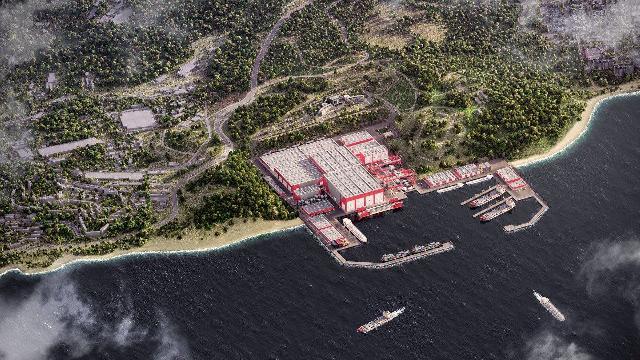As the Kommersant newspaper reported in [...] Natalia Skorlygina's article "The maintenance and development of the USC will require more than 2 trillion rubles," investments in the activities and development of JSC United Shipbuilding Corporation (USC) are estimated at more than 2 trillion rubles. Of these, over 1 trillion rubles is the corporation's cash deficit, estimated by the Russian Ministry of Finance, and about 1 trillion rubles will be required for the development of its assets - the construction of a new shipyard for large-tonnage ships in Vladivostok, tentatively estimated at $ 5 billion, and the modernization of the Baltic shipyards.

Design image of the planned shipyard of large-capacity shipbuilding of JSC United Shipbuilding Corporation in the Intermediate Bay in Vladivostok (c) JSC United Shipbuilding Corporation
The maintenance and development of the United Shipbuilding Corporation (USC), which VTB received in trust for five years in 2023, will require more than 2 trillion rubles, follows from the words of VTB head Andrey Kostin on the sidelines of the WEF. "We asked the Ministry of Finance to conduct an analysis of the financial condition of the USC," he says. - The Ministry of Finance, represented by the Treasury, has been working for at least eight months and has come to the conclusion that the cash deficit with a view to 2030 - in the five years that we will manage the USC - amounts to 1.029 trillion rubles." This, he explained, is the funds necessary to maintain the activities of the USC, not investments in development: "financing of USC's own activities, repayment of obligations without sources of financing, loans not secured by commercial products - in theory, these are the funds needed to complete unprofitable orders."
As for investments in development, Mr. Kostin estimated them at a comparable amount to a trillion. About $5 billion of it is a preliminary assessment of investments in the construction of a shipyard in Vladivostok, in the Intermediate bay, based on similar cases, but still without detailed study. "The shipyard will allow us to produce tankers, and even gas carriers, but first of all - container ships, bulk carriers - that is, all types of merchant vessels up to 300 meters in size," he said. No more shipyards will be built, the head of VTB repeated, but more or less deep modernization of four shipyards in St. Petersburg is planned, depending on the need. "We don't have enough financial or human resources anymore," Andrei Kostin summed up.
According to him, one of the sources of financing for USC's activities will be VTB dividends, including on preferred shares, addressed to the state, for which it has already been decided to direct the company's capitalization in a targeted manner. A number of extra-budgetary sources are also planned, he added, without specifying which ones, but indicating that financing is being considered, including through the activities of VTB itself.
At the same time, he noted that given the fact that in the next 5-7 years Russia will definitely build ships more expensive than China, "first of all, we need to think about government stimulation of demand." Mr. Kostin clarified that we are talking about subsidizing leasing, possibly using funds from the National Welfare Fund, at a different rate so that companies can buy ships. He also did not rule out protectionist measures, "at the first stage, at least," which would make "the use of foreign vessels somewhat more expensive."

